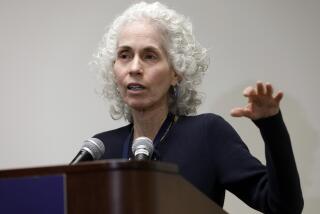As medical bills mount
- Share via
Caroline Rivas and Ann Rose learned the hard way that having health insurance won’t prevent medical debt.
Rivas, a project manager in Los Angeles, has delayed needed medical exams because she can’t afford to add to her out-of-pocket expenses. Rose’s family filed for bankruptcy protection after a complicated pregnancy and the birth of her son, who has cerebral palsy.
Although families without insurance have a higher risk of running into medically driven financial trouble, the majority of people who report such debt problems are insured, a new survey has found. And almost all those families find it hard to keep up with at least one other basic household expense -- such as rent, a mortgage and even food -- as a result.
The study, conducted by the Center for Studying Health System Change, a nonpartisan policy research organization, found that one in seven American families with insurance reported problems paying medical bills in 2003.
“It’s not just a problem for people who are uninsured. It’s actually every bit a problem for people with insurance coverage,” says coauthor Peter Cunningham, a senior researcher at the center.
The study, based on a nationwide survey of 25,400 insured and noninsured families, estimated that almost 13.5 million U.S. families have medical debt despite having insurance. Among all people with medical debt, one in three did not get a needed prescription drug, one in four delayed care and one in eight went without needed care.
“More and more people are getting stuck with the bills,” said Randy Boyle, an attorney with the National Health Law Program. The program is an affiliate of the Health Consumer Alliance, which helps low-income people get healthcare.
With the cost of medical care rising so rapidly and with more health plans and employers shifting costs to plan members, health insurance is not what it used to be in terms of providing coverage, Cunningham says. Higher co-pays, deductibles and premiums are pushing more people into medical debt, he says.
As a result, family members with unexpected hospital costs or a permanently disabled relative are more likely to forgo their own care, the study found. “They may be reluctant to get medical care for other family members because of the worry of increasing their level of debt,” Cunningham says.
Although they had insurance coverage, Rose’s family incurred $500,000 in medical bills from her pregnancy and her son’s premature birth. She quit her receptionist job because of the complications. Her health benefits ended soon after the child was born and diagnosed with cerebral palsy.
“They kept sending us bills and we fought with them and fought with them,” Rose says of her experience with her former insurance company.
The medical expenses quickly overwhelmed the Colorado family. They saw bankruptcy protection as the only way out. “There was no way we could ever pay them back.”
Because their resources are dedicated to the needs of their son, now 6, the Roses have forgone insurance for themselves and their 3-year-old daughter.
“A lot of people who incur debt, they don’t want to talk about it,” says Linda Feldman, spokeswoman for the Venice Family Clinic. “They’re paying for their healthcare with their credit cards.”
Consumer health activists see little relief for families struggling with medical debt. “The only thing that’s happening is that more cost is being put on the consumer,” Cunningham says.
Rivas can attest to that. An employee of a health advocacy organization, she’s trying to ignore a still-undiagnosed bladder problem. In the last six months, she says, she’s paid roughly $2,000 for procedures and prescription drugs that were only partially covered by her plan.
Although she needs more tests, she can’t afford to add to the $700 in medical bills she owes. She has put the bulk of these costs on her credit cards, she says.
With rent, student loan payments, car payments and now medical bill payments, “I don’t have a lot of disposable income,” she says. “I just don’t know what the consequences will be of waiting a few months to do the tests versus doing them now.”
More to Read
Inside the business of entertainment
The Wide Shot brings you news, analysis and insights on everything from streaming wars to production — and what it all means for the future.
You may occasionally receive promotional content from the Los Angeles Times.










